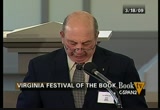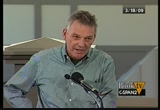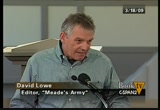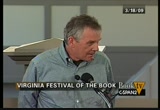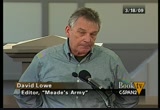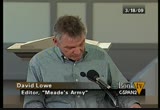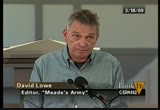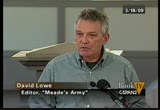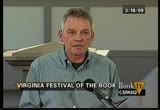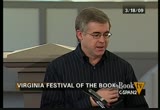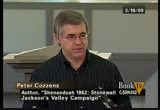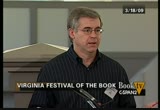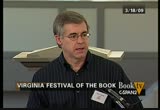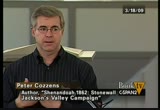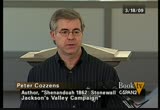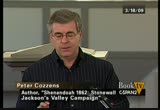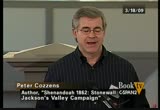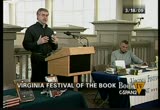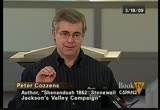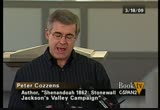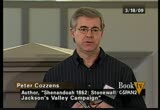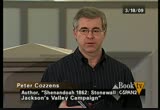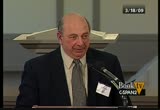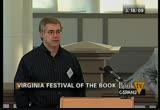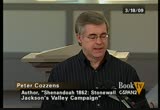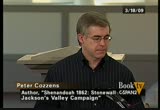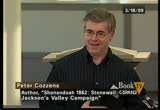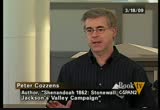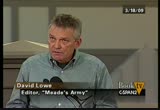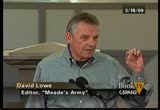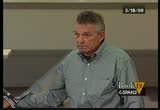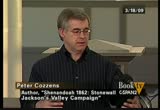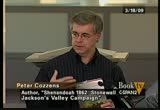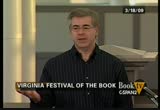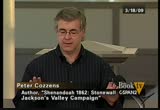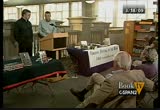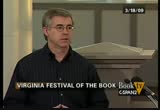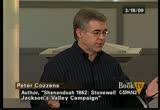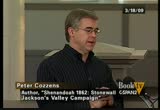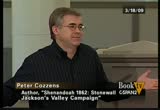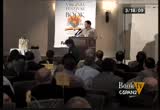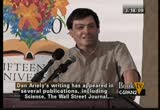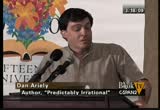tv Book TV CSPAN August 15, 2009 2:30pm-3:30pm EDT
2:30 pm
anything in the bookstore during the festival of the book. without further ado i would like to bring up david lowe to present his boat, need's army. [applause] >> thank you, appreciate it. quite an honor to be invited to talk about my book. to be called the author is probably stretching it because i am the editor of a very brilliant writer, the writers theodore lyman. people who study post gettysburg are familiar with the name theodore lyman. i did a survey of borden ray's books on the overland campaign, each site him 35 to 45 times. in the footnotes. it is because he is such a good writer and was such a good writer and very descriptive. it gets to the point that it is
2:31 pm
embarrassing, you know loggers say theodore lyman said it is -- a staff officer said. theodore lyman is familiar to so many people who study this period of the war, is his letters were published in 1922. the title of that book was meade's headquarters. the letters were written to his wife, the letters were edited by his nephew, the book was published by the massachusetts historical society. i was very interested, i read everything in the letters and was fascinated reading the letters. by special interests is civil war, fortification and engineering, that sort of thing. it seems every time things
2:32 pm
started to get interesting in his letters, the editor did one of those ellipses. so i read the letters and decided i would spend a week at the massachusetts historical society and go back to the original letters and pull out, tease out the extra meaning that the ellipse stood for. by the end of four days i was extremely fascinated by the letter itself, and i found a dozen, were 15 very nice paragraphs. theodore lyman had gone into more detail. that was worthwhile. the last day that i had, i had to go back the next day.
2:33 pm
i said agassi eventually quote from what he calls theodore lyman's journal. i guess i had better look this journal up and see what it is. it can't be much, somebody published it already. as i got in, i started looking on the microfilm, and my eyes regarding bigger and bigger and called for the regionals and i realize that here were six closely handwritten note books that deal lyman had maintained throughout his service, from september 18, '63 to the end of the war, as george gordon meade staff officer. yes, there was a lot of the same material, he experienced the same things, but in the letters,
2:34 pm
he would talk about something in a different way than he talked about in his notebooks. all his letters were written to his wife, he was very concerned not to upset her. and not to get too graphic or too much -- too much of the details that would go over her head, and he was always playing down the danger whenever he rode home. and there were those that thankfully these passages don't show up in the published version. but he did fill his letters with very breezy endearments to his wife. indeed, there needs to be a new edition of lyman's letters to include this material. i was familiar enough with the letters when i started reading this, i recognize the tone and i went to the chief librarian at the historical society, anybody working on this? not that i know of.
2:35 pm
who was the last person to look at this? gordon ray was in a couple years ago. good. so i went to my faculty adviser at the time and said i have this thing, i think we need to publish it if you will help me. he steered me on the right course. kent state university thought it was a great idea and followed me through all the way. the thing about theodore lyman, he is a typical boston braman. typical boston braman. his family, his father was of mayor in boston is that clues you in. his mother came from a very wealthy family in new york city, they were traders. the grandfather built a huge
2:36 pm
estate. all the uncles and nieces and nephews and relatives are totally in the boston hierarchy. this is interesting. his personality really does come through, for better or worse. my wife and her mother spent a lot of time proofreading the manuscript and they came to me one day, my mother-in-law, particularly outspoken, she said i don't like this theodore lyman. [laughter] i said why? he is so full of himself, he is a snob, he says bad things about people. i said that is who he was. thank you for your opinion. interestingly enough, a good friend of mine, a historian, started reading the book in the middle. because he is very interested in wilderness and he started middle and went back to the beginning.
2:37 pm
and he said if i had read the first part i would not have liked theodore lyman at all. he looked down his nose at just about every ethnic group including the irish, though he acknowledged they could fight if they were well lead. the u.s. colored troops, he looked down at the idea of -- why can't white people find their own wars? as the book goes on you can see a change in him, that he begins to appreciate the quality and appreciates why some of the colored troops are fighting, occasionally admired their drill. the germans, he had no use for at all. he said to the governor of massachusetts, don't send us any more germans. theodore lyman showed up, he was -- he spent the first two years of the civil war in europe doing
2:38 pm
the grand tour of capitals, he had just been married, his wife was pregnant, he came back, he wrote a letter to general meade saying i need somebody on your staff. when theodore lyman was in college, harvard, the scientific school after harvard, he studied under professor louis agassizs, a premier nationalist of the 1800'ss, was talk to observe and record everything. theodore lyman carries these traits into serving as a staff officer. louis agassiz sent him to florida to dredge for starfish. he was an expert in starfish. there he met in 1856, george gordon meade.
2:39 pm
he was working on lighthouses for the u.s. army corps of engineers. he was a topographic engineer. he was laying out the proper places, mapping areas, supervising lighthouses. the two of them became very good friends despite a vast age difference, at least 17 years difference. theodore lyman was in his 20s at the time. they really got along well. so they had always kept up this correspondence over the years, and when theodore lyman decided it was time that he should do something for the cause, he thought immediately of his old friend, george gordon meade. he said sure, if you want to come, stay a couple months and go home, tell everybody you did your part, come on. but underneath that, an interesting letter, i quote some of it in the introduction, he offers more of a challenge.
2:40 pm
it is more like i understand you feel you have to do something to impress all of your blue blood friends, etc.. but really, i could use some help here. when theodore lyman showed up at headquarters in september of 1863, he quickly found a niche, he became the headquarters archivist, he kept notes on everything, all the campaigns, he made little sketch maps, which i included all of his little sketch maps. every time the army makes a significant move, he sketched a little map, almost short and. so that he could track the campaign. there are 70 of those sketch maps in here which are interesting themselves. he uses the symbols of the court on these maps.
2:41 pm
whenever meade had to write an official report he said he threw up his hands, the airline and worked behind scenes to help him write his report. he had a great impact. his contact in the headquarters are just astounding. i tried to footnote all of these people that he meets. he was a real outgoing individual, an extrovert, theodore lyman. also, he was intent on attracting everyone he met in the army, and describing them so he would know them again himself, and also showing where they fit in on the old hierarchy of command, particularly other staff officers that he would have to deal with, he recorded their names. i spent a lot of time trying to
2:42 pm
identify these individuals. it is all is irritating to me to read a memoir or letters or something, they are just names and after a while if they are not identified you gloss over them and go on. i made an effort to identify these people. the problem is, when he goes back on leave to boston he is even worse because he has his dinner parties, social obligations, i did try to keep all of his descriptions when he goes back to boston because the contrast is amazing. he will leave the front and get on a train. he has a state dinner at willard's in d.c. and within 26 hours he is in boston and then he is all dressed up, they are going to see the opera in boston. he has to describe the opera. it really puts theodore lyman in perspective which is why i work to maintain the section.
2:43 pm
a lot of the diehard civil war enthusiasts will skip over those little pieces. it has been a pleasure working with the airline and all these years and i think -- my sense is that this book should be read and used in conjunction with the letters, because they really do support each other. one fills in gaps that the other one doesn't. studying the two together, plus identify the people in need's headquarters in my notes, they are fairly sparse, so that working with the two together you get a rounded picture of how this boston braman made an impact on the army of the potomac and he stood by his general to the very end. don't look for him to trash meade too much, though
2:44 pm
occasionally does a some spotty thin thank you. >> and now, peter cozzins, shenandoah 1862. >> it is impossible to do a campaign justice in 20 minutes, even 20 hours. so i am going to teach you a bit with some aspects of the book and some things that i discovered in writing it. as i am shore all of you know, given the proximity of the shenandoah valley and the importance of stonewall jackson to this region, the shenandoah valley campaign was one of the most legendary campaigns of the civil war. the very last month of the
2:45 pm
campaign, stonewall jackson fought four battles, one involved -- preserve the shenandoah valley for the confederacy. legendary campaign, made stonewall jackson a household name. given the stature of this campaign, one might ask why i wrote this book. i wrote it because i was amazed as important as this campaign was, there had not been a balanced study of the campaign ever written. we can use that word fairly in describing this, no work before it. there were only two book sized studies done previously on the shenandoah campaign.
2:46 pm
it is rather remarkable. more remarkable is the fact, not so remarkable given the iconic stature of stonewall jackson, as his campaign is a household name. this told the story of the campaign exclusively. i can't emphasize enough, exclusively from the confederate point of view, in 1882 by one of jackson's former staff officers. we can imagine how objective that was. the second was a book by robert tanner called stonewall, the valley, a very well-known, well written work. tatter states explicitly in his introduction that his purpose is to tell the story strictly from the confederate point of view. he does that well, looking at his forces, maybe 300 primary
2:47 pm
sources. this startled me. my initial thought was how can one do justice to a campaign or evaluate jackson's accomplishments in a vacuum from just one perspective. i went into this book with the intention of presenting the campaign from both sides. i had no -- this might sound unusual, i really didn't have strong feelings about stonewall jackson either way. most of my writing and research had been done on the civil war and the west, i wrote a biography of john pope. i didn't have strong feelings about him. i want to touch on some things that struck me in the course of writing this book that since affected my views of jackson very strongly and very
2:48 pm
negatively. one of the characteristics of jackson, if you are inclined to think highly of jackson you would find disturbing, is extreme secretiveness, which he took to, i think, almost an absurd extreme. he would not even tell his seconds in command what his plans were for battle. this is particularly evident in the first major clash in the valley campaign, is one tactical defeat. he said not a word to his second-in-command of his plans. again, i will teach you a bit, if you read in my account, who is following his outstanding work, we both come to the same conclusion about the effects of jackson's hermetic nature in the
2:49 pm
battlefield. another characteristic about jackson that emerges from my book, i didn't go into the book with any preconceived notions, jackson's tendency as a scapegoat. i read that in with another trait of jackson's that also disturbs me, he has been described as a deeply religious man, and in his own way he was. but i found much in his business to, when you look at his actions, as a general, b, lack of a better word, hypocritical. he is not consistent with what i consider the christian faith to demand and what, as a presbyterian and devout presbyterian, i would think would be incumbent upon jackson to pursue in his actions. whenever he won a victory, he would give full credit to the
2:50 pm
almighty. it was god's will when he won a victory, and he began his dispatches richmond denouncing his victory, saved by god, by god's will. and so forth. whenever he lost the battle, he would look for a scapegoat. immediately. it was as if it was god's will to win a battle, a battle in which he was commander, but god could not possibly have willed a defeat. it had to be someone responsible for it, who was not him. this is most evident where his corps second-in-command, general garnett, the tactical commander of the field, jackson was removed from the fighting, at the end of the battle, the only sane thing, along the same
2:51 pm
stonewall, does the the last two or four rounds of ammunition, the federal's were finally getting their act together, garnett gave the order to withdraw, did know what jackson's intentions were, he took the only sane course of action, every regimental commander who served under him that day, every private soldier, every junior officer, were forever grateful that he made this decision, he saved the army. jackson, as soon as the battle was over, press multiple charges against him. garnett was whisked away to face
2:52 pm
court-martial. he was not able to take command in to gettysburg. those two traits, seeking scapegoats, consistency in his professions of faith as far as his actions in the battlefield. i don't want to exceed my time. his tactical abilities to be wanting. seeking the enemy out. this left something, left a good deal to be increasing piecemeal
2:53 pm
2:54 pm
in mind. this emerged in my analysis of jackson. another aspect of the campaign that was very interesting, taking jackson out of the picture. the way president lincoln approach the campaign, stonewall jackson's overarching executive -- objective was to keep federal troops that otherwise would have joined general mcclellan in his movements against richmond, the peninsular campaign, to keep federal troops occupied in the valley or to cause troops that otherwise would have reinforced mcclellan to be diverted in the valley. in this he succeeded very well on his aggressive actions in 1862. his victory in the valley was
2:55 pm
just as much a failure, strategic failure on the part of abraham lincoln that permitted this outcome as it was. when news of the second significant victory, the battle of winchester reached washington, lincoln's reaction was not to panic as many have assumed but instead to close the back door on jackson. jackson pursued the federals to harper's ferry. good indication he might cross the potomac river, lincoln's reaction was to try to prevent his withdrawal south of the shenandoah valley, in doing so this coincided with the precise moment when george mcclellan
2:56 pm
finally found himself to begin his long-delayed attack on richmond. mcclellan had well over 100,000, 20,000 men facing him. and army of 50,000 under joseph johnson. we had a tendency to grossly exaggerate the number of enemy forces he was facing, at the moment that he began his serious effort against richmond, a force of 40,000, was to come down from the north to join mcclellan who was approaching the army from the east and attack richmond from two directions. johnson appointed 50,000 men cote -- could not have stretched
2:57 pm
his lines to defend adequately against simultaneous attacks or even an attack by either of these forces given how far he would have had to stretch the line. even as somebody as cautious as mcclellan, lost under these circumstances. at that moment, jackson won the battle of winchester, push the small federal force out of the valley, lincoln's decision, it was offensive in nature, not based on fear, but it was the wrong decision. he took his eye off of the ball. he diverted is 40,000 men away from the movement against richmond, into the valley with the intention of mcdowell closing in behind jackson in the east while a small federal force of about 60,000 men under fremont approach across the
2:58 pm
alleghenys from the west to close the door on jackson before he was able to fall back up the shenandoah valley. that again was a tremendous strategic error, because if mcclellan -- that was minimal, pretty likely the outcome that mcclellan, extra 40,000 men would have succeeded in taking richmond. if that had been the case, jackson's command of the valley would have been totally irrelevant. there would have been no consequence. in a sense, jackson's success was a consequence of a strategic error. be that as it may, jackson did accomplish the objective set out for him by joseph johnson and property which was to convert federal attention to the valley. he succeeded, his
2:59 pm
aggressiveness, strategic error allowed the valley campaign and gave its signal, strategic importance, as they deserve federal efforts against richmond and allow veterans to live and fight another day. the second significant outcome of the campaign was a tremendous boost to southern morale. the south had won a decisive victory. the emergence of property lee. thing going uniformly poorly. from present-day new mexico, the expedition toward california, to new orleans, which fell to the union in the first week of may, 1862. earlier in the year, the battles in fort henry and fort
3:00 pm
donaldson, a successful federal general of national importance, these victories essentially closed the cumberland tennessee rivers to the confederates, john pope won a battle, bloodless battle on number 10, knocking out one of the strongest confederate fortifications and the mississippi river, mississippi bankruptcy of the corporate defense. a string of defeats. the principal confederate army in the east, backing up, tremendous -- the first grand effort at consolidating concentrating forces. horrible strategic defeat. all of these are going wrong.
3:01 pm
small victories to the confederacy that was starved for good news. jackson is -- his praise was some in the southern home front. the campaign is twofold. the federal effort against richmond providing a boost to confederate morale, and the third leak, establishily, estabn of stonewall jackson. i hope to have tease you enough to pursue this further, thank you very much. [applause] >> thank you very much, peter. the books will be here after the
3:02 pm
3:03 pm
>> i can't recommend it highly enough. lyman is remarkable. is writing style and his descriptions and his dry wit, just hit you in the face. it's a marvelous, marvelous find. >> could you talk a little bit about the relationship with andrew jackson? >> very good question. it wasn't particularly good. there was a lot of strain between turner ashby was jackson's chief of cavalry during the campaign. ashby was something of a night as i call them in my book, a very romantic figure, a very dashing figure.
3:04 pm
had a real independent streak to him. was not particularly good at commanding a force larger than two or three companies. he led by personal example. he was always at the forefront of everything, which is great if you weren't company commander, but somebody who is chief of calgary doesn't work too well. he owed his position as commander of the confederate calgary forces in the valley, which is really a desperate group of companies thrown together, over a period of two months. he owed his commission, appointment directly, it's a jackson's authority over him very much the campaign was rather tenuous. at one point in the campaign, jackson became so fed up with ashby's going solo that he relieved him of command, or attempted to.
3:05 pm
various peoples interceded and that didn't transpire. but again, jackson did not feel that ashby was able to control the calgary forces of the valley army, as small as they were. basically just a glorified regiment put together. and he admired ashby's courage, no question about that. but he just again, didn't feel that ashby could fulfill all of the roles of the calgary commander. and before launching into the face of the campaign that led to the battles of front royal and winchester, though stunning victories of jackson, he contemplated devoting ashby to a position of chief of the rearguard. and again, ashby threatened to
3:06 pm
resign. so it was a very tense relationship. when ashby was killed, that he was killed doing exactly what he shouldn't have been doing. he was killed leading to infantry regiment on foot after his horse was shot out from underneath them. but leading to infinite regimen in harrisburg, not the place for a chief of calgary to be. jackson of course mourned his death, mortise loss as a courageous soldier. but i got to wonder in the back of my mind how much he really missed him in his role as chief of calgary. so it was a strained relationship. ashby i think also felt frustrated by jackson. if you read my friend gary at the bar who is speaking next weekend, a marvelous book on the battle of winchester, you'll see that ashby during the retreat of the federalist and strasburg to winchester, he lost control of what many had, and when jackson
3:07 pm
won at winchester and the federalists were falling back, north along what today is route 11, and jackson was looking for calgary to pursue, ashby was nowhere to be found. he wasn't there. and jackson was tremendously frustrated by this. i mean, livid. so that in a nutshell, i think they admired each other. jackson admired ashby's courage but i think would have preferred someone else had he had any say in the matter. >> i have a question for david. the maps are in the book. are there any other sketches or battle scenes that were in those drawings? >> actually, some of his best maps have yet to be published. these are really a shorthand
3:08 pm
sketch maps for him to jog his memory when he is talking about these campaigns. he became very good friend with a topographical engineers in the headquarters of the potomac. he made quite polished finished maps. these maps that he spent so much time on, he typically folded up and put in a letter home to his wife or to his good friends. so scattered among the letters in the massachusetts historical society are at least 20 probably very, very detailed maps of civil war battles or campaigns. he wasn't much of an artist in terms of depicting battle scenes. he did like to draw caricatures of the other staff officers. some pretty funny images there. i did want to -- i appreciate peter's perspective on stonewall jackson over the years.
3:09 pm
i ago someone mentioned and the valley as well. and i came to similar conclusions about jackson. of course, jackson wears this halo around his head. but i was one day working on a battlefield with a veteran farmer in piedmont, augusta county. and economy something, which i thought was very interesting. i believe it's during the second manassas campaign where jackson is making his big flight marked up along the mountain ridge, and there is a description of him sitting astride his horse with his hand up in the air like this. and everyone who came by commented on it as though jackson was bestowing their blessing, and they did know what to make of it other than stonewall is there with his hand up in air. it must be important.
3:10 pm
well, this farmer, i am standing on the hill talking with him. is showing me, you know, he owns the battlefield basically. and the net surges in your face and everything. and so he is standing there like this. and i said, what are you doing? he said, well if you raise your hand above your head, the gnats will go to the brightest spot. [laughter] >> so thank you very much, sir. that just gave me a perspective and joaand stonewall jackson. i appreciate it. >> that is how history is written. >> often didn't see eye to eye. how did lymon observe those differences and what was his personal opinion? >> a great deal of disgust,
3:11 pm
particularly by the end of the war, he felt that chariton ran away with all of the glory of the campaign. even wrote a piece for the boston newspaper immediately after the war which i have included, at the end of the book, in chronological order, where he takes down the contributions that need major victory and takes down the fact that phil sheridan did not command have as many troops as meade and he was not commander of the troops and sailors creek, a and humphreys and worn pulled over, successor at that point, and he is quite critical. he said that chariton was fortunate in the music of the calvary, which was the trumpet.
3:12 pm
>> what was lymon's opinion of grant and especially their relationship between meade and grant? >> it comes out pretty good. he was impressed with grant. and he has some good descriptions of grant. particularly the scene where, you know, he is carving under the tree in the wilderness and that sort of thing. except i think instead of smoking a cigar he is smoking a pipe, as lymon observes its. but he had a very favorable opinion of grant. at first he was concerned for the most part, he thought that grant and tr meade got a well. of course, as grant accrued more and more credit for the
3:13 pm
operations of the army of the potomac, there was a lot about tension that builds up in lymon is very good at describing the tensions. and he did talk about the severity of grants migraine headaches, which i knew he had headaches. i had read that, but he describes -- lymon describes grant lying in his tent and darkness giving him chloroform for his headaches. i just thought that was interesting. >> i can tell without having book yet that both of you did a tremendous amount of research and use a lot of original materials. are there any kinds of materials that exist in the later periods, like today that you wish had been available then that would've helped you tell a story? >> i mean, in writing any campaign study, this is my fifth campaign study, there's always
3:14 pm
going to be things that you discover subsequently, new, and going to knock herself in the head. but at some point you have to cut off where you think you have enough detail the story properly andrology mopar the proper conclusions. there are a number of soldier accounts that you know i have discovered since the valley campaign that i think may have added additional color. i hope there is quite a bit of color, i think there is, additional color to the work. might have sharpened the focus here or there about it or reinforced with certain people are saying. i don't think anything that i have come upon would have changed anything chromatically. i was writing about it, the campaign that i started this book in november 1861 when stonewall jackson took command
3:15 pm
in the shenandoah valley because i wanted to generally thought to begin in march, 1862 when jackson was defeated. but i didn't actually get to the battle of kerns down until around page 100 or so. i waited for the romney campaign in the winter of 1861. i wanted to show where jackson stood with his men with his subordinates, and in the confederate generals when the campaign propers so to speak began. so my point in a roundabout way was i wasn't trying to tell real detail the stories of each battle. i couldn't. you have a book of 600 pages. i think i had a good balance. i don't think i missed anything of real significance. again, if you want, if you want a real detailed tactical study on winchester, gary who is
3:16 pm
speaking next on his books or where to look. i think for the overall campaign, i don't mind tells a story. i have to balance the amount of detail i go in. earlier books i have written, chickamauga, chattanooga, again, i haven't found anything that would've changed my conclusions in any significant way. >> you don't wish they were texting each other? >> we wouldn't have anything. nothing. no record at all. >> i did want to make one point, and is the sort of a fleeting opportunity. and maybe it still will pan out. but through the research and doing the book, i discovered that theodore lyman's groom, he was 16, 17 year-old albert woods, son of his housekeeper and went to war with him, had kept his own journal throughout
3:17 pm
his entire time from 1863 through the end of the or. i was completely fascinated with the possibility of finding this to antecedent in the eyes, you are seeing the headquarters through the eyes of lymon and then through the eyes of his 17 year-old. i did contact the family, or the family actually contacted me. and they are quite well-connected. they have genealogist and everything in their family grew. and they are now looking frantically for this journal. and i hope and pray that they find it. it would be a very interesting addition. >> you mentioned about jackson not giving credit to ashby. art there several times where ashby's seventh virginia bailed out of jackson when things were going too well wacs. >> no. at the gal that was strictly an
3:18 pm
infantry fight. ashby's calvary was not involved in that battle. and again, at mcdowell, jackson came upon two federal prograde. and usually one federal prograde and then a second -- first under milroy and then the second. he was on high ground looking down on mcdowell, and he came upon the battlefield afternoon. his plan was to stop for the day. he detailed jedediah hotchkiss, who was his famers topographical engineer to find away around the federals so he outflank and the next day. and ashby played no role. jackson, general milroy was a real feisty guy and he knew he had to fall back the next day. so he decided to launch a kind of a holding action, diversionary action.
3:19 pm
delaying attack. and got permission from four regiments against jackson, completely taking jackson's by surprise. and this was a battle that they fought to a standstill, more casualties that he endured. ashby was dead by the. he was killed a week earlier. is calvary played no appreciable roll there. and the confederate calvary that was involved, trying to pursue the two federal prograde that falling back down the page valley, burnt themselves out after a couple of miles. off the top of my head, i can't think of any time with ashby bailed him out. in fact, it was ashby's incorrect conclusion as to the federal strength in winchester
3:20 pm
that largely led jackson to give battle there. ashby had a skirmish the night before, had intelligence from women in the city, and other sources concluded that there were only a handful of federalists in the area when in fact, they outnumber jackson about three to one. so ashby really, i mean, it in the larger scheme of the things he didn't do jack's indicators. >> we have time for one more question. [inaudible] i'm curious, i imagine it wasn't positive but i'm curious about the impact the continual deceits. >> that's a fantastic question. i'm glad you asked that.
3:21 pm
jackson, his reputation was -- he was held in sort of all. and he was spoken highly in the northern press of how his enemy commander would be in the valley. i think most importantly that the troops he faced in the valley, freemont command, general nathaniel banks, a core that bought into campaign, and mcdowell's core, they were all thrown together a few weeks afterwards into an army, army of virginia that they cobbled together to give battle aggressively to robert e. lee, something that mcclellan had failed to do and to bring part of a harder, a republican part of borchard east. pope being one of the staunch republican generals in the army. and the army that was cobbled together around him, they were
3:22 pm
scared of jackson. i mean, they were intimidated badly. and i think that was -- that is a factor in pope's defeat at second manassas. district, they were afraid of jackson. and it was jackson he gave to principally in the second bull run. a very good question. >> we will do one more. >> stonewall jackson and lee worked so well together. what would've happened, you believe, if stonewall jackson hadn't died when he did? >> you know, -- >> thing start to fall apart. >> because jackson after the valley campaign, he came to fight after the seven days of battle around richmond. and as you know, was mediocre,
3:23 pm
inconsistent. he fought well at fredericksbu fredericksburg, fighting a defensive fight. chance they'll came along. it was a flank march that lee decided upon was a risky maneuver against an army again about twice his size. it worked. what i think that jackson's attack it pretty much run its course after that first evening. the federalist gathered a huge amount of artillery and was blown away any further attack. so jackson had run his course of there. so he had an inconsistent performance. i think a lot of that gettysburg would have depended on how well rested jackson was. and a lot of intangibles. i think you would have probably performed better than you'll.
3:24 pm
ewell was not want to take on a lot of responsibility. he was a wonderful subordinate, but not real good when he had to make significant decisions beyond a strict tactical level himself. so i think jackson probably would have seized the initiative, or continued on the first day more aggressively. again, jackson, he was not consistent. so it's hard to say. that's kind of wavering offering an opinion you. >> peter cozens and david lowe, "meade's army" and "shenandoah 1862", they will both be here. brian higgins, thank you for the refreshments. and don't forget the lincoln program that comes up in about an hour. so thank you very much for being a part of today. [applause]
3:25 pm
>> good morning. what a great idea to start breakfast early in the morning after saint patrick's day. [laughter] >> so i want to tell you a little bit about irrational behavior, and behavioral is a very applied to feel. my interest in this field started from a very applied perspective. many years ago i was injured in
3:26 pm
an explosion and i spent a long time in hospital as a consequence of this. and hospitals by the way are a wonderful place to watch all kinds of irrational behaviors. [laughter] >> but the thing that was most difficult for me in this case was the process of removing bandages. i was in the burn department, 70% of my body was burned and taking bandages was a huge part of my torture. now, if you think about it, you almost had taken a band-aid off at some point and you almost have wondered what is the right approach. do you rip it off, short duration, but every second is painful. or do you take it off slowly, many seconds that each second is more painful. which one of those is better? you have your own intuition and it turns out the nurses in my departed father right approach was the ripping approach. [laughter] >> so they would grab hold, they would rip the bandage and they would grab the next one and continue because i had so much of my body burned it took about 45 minutes to an hour to do
3:27 pm
this. and as you can imagine, i hated with passion this moment of tearing. is one thing to take a band-aid off and it is gloom and sticks to it. it is another thing that you have no skin and bandages really adhered to the flesh. is incredibly painful and not wishing this on anybody. and i used to argue with the nurses. i used to say why do we do it in a different way. why don't we take it slower, take two hours but don't have this real terrible tearing. i didn't say this calm way of course. [laughter] >> i would try to convince them to do this, and the nurses told me to think. they told the first of all, that they were right. that they had the right model of the patient if they knew what would cause me less pain. and the second thing they told is the word patient doesn't mean intervened like suggestions. [laughter] >> this was in israel but it turns out it is in every language i have known since then. [laughter] >> so i didn't keep exactly
3:28 pm
quiet but the nurses kept on doing what they thought was the right thing to do for the next three years. when i got out of the hospital, i learned about the experimental method one of the most interesting lessons in college was that sometimes if you have a question you can create a parallel of that question in the lab and uke and investigated very carefully and you might come up with an answer. so i was still bothered with this question of how people integrate experiences over time. and what i decided to do was do an experiment on this. i didn't have much money in the beginning so i went to a hardware store and i bought a carpenters buys, and i would bring people to the lab and i would crush their fingers. [laughter] >> and i would crush their fingers for short duration and long duration, up, down, with breaks, with outbreaks. and when i finished each of these little crunches, i would ask people how painful was this and how painful was that? and if you had to choose one of the last two which one would you do again. [laughter]
3:29 pm
>> and as i finish this round of experiments, like all academic projects i got more funding. i moved to electrical shocks. [laughter] >> better equipment. and what i learned at the end was that the nurses were wrong and they were wrong in multiple counts. percival it turns out that we don't prolong an experienced you don't actually prolong the pleasure of pain. think about a. if this lecture was good to be twice as long it won't necessarily be twice as pleasurably painful, you can decide. [laughter] . .
185 Views
IN COLLECTIONS
CSPAN2 Television Archive
Television Archive  Television Archive News Search Service
Television Archive News Search Service 
Uploaded by TV Archive on

 Live Music Archive
Live Music Archive Librivox Free Audio
Librivox Free Audio Metropolitan Museum
Metropolitan Museum Cleveland Museum of Art
Cleveland Museum of Art Internet Arcade
Internet Arcade Console Living Room
Console Living Room Books to Borrow
Books to Borrow Open Library
Open Library TV News
TV News Understanding 9/11
Understanding 9/11